News & Event


News & Event
News & Event
[The 104th KISTEP Wednesday Forum] ‘The Future Drawn by Quantum Technology : Current Status and Issues of Quantum Computing’
- Writer Kyungran Choi
- Date2019-05-09
- Hit1,040
File
-
Download
 20190509102016.jpg
(36.01KB / Download 187회)
20190509102016.jpg
(36.01KB / Download 187회)
KISTEP held the 104th Wednesday Forum with the theme of ‘The Future Drawn by Quantum Technology : Current Status and Issues of Quantum Computing’ on May 8th (Wed), 2019.
The forum was held to explore the current status of development and trends in Korea and abroad, focusing on quantum computing, a new concept of computing technology that can solve complicated and difficult problems that cannot be solved through the current computer technical skills, and to explore the strategic directions for Korea's quantum computing.
The forum was held to explore the current status of development and trends in Korea and abroad, focusing on quantum computing, a new concept of computing technology that can solve complicated and difficult problems that cannot be solved through the current computer technical skills, and to explore the strategic directions for Korea's quantum computing.
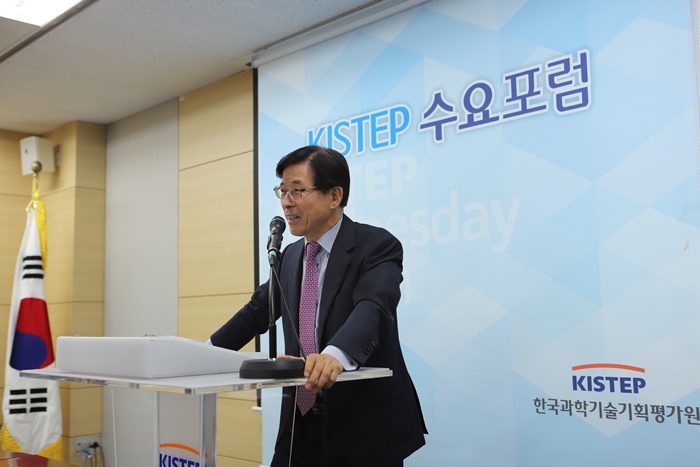
[▲ Sang-seon Kim, (President, KISTEP)]
The forum began with an opening address by President Sang-seon Kim (KISTEP), followed by presentation by Yonuk Chong (Principal Research Scientist / Head, Quantum Technology Institute, Korea Research Institute of Standards and Science (KRISS)). Panel discussion were led by Chang Ho Shin (Director General, Research and Patent Licensing Asia-Pacific IP, IBM), Dohun Kim (Assistan Professor, Department of Physics and Astronomy, Seoul National University (SNU)), Taehyun Kim (Assistant Professor, Department of Coumputer Science and Engineering, SNU), and Sung Wook Moon (Principal Research Scientist / Director, Center for Quantum Information, Korea Institute of Science and Technology (KIST)) and open floor discussion followed the last.
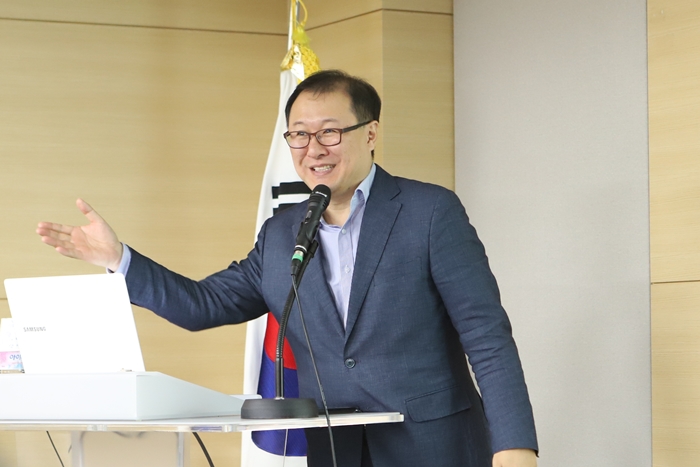
[▲ Yonuk Chong (Principal Research Scientist / Head, Quantum Technology Institute, KRISS)]
Head Chong explained the origin of quantum mechanics and its information through the presentation. He mentioned the development of technologies that enable to deal with quantum, Shor’s algorithm and the background of growing interest in quantum computing in the late ’90s.
He compared the basic unit of quantum computer calculation, ‘Qubit,’ with the digital unit ‘bit,’ and explained the principle of quantum computer. He also revealed that increasing keep number of qubits and reducing errors in the operation procedure are the right way to develop quantum computer.
Lastly, he emphasized the need for Quantum-Smart human resources, which can naturally accept quantum as a part of their daily lives, by presenting the status of quantum computing at home and abroad. He also asserted that quantum computing is now entering the era of ‘Noisy Intermediate-Scale Quantum where errors exist,’ and it needs for quantum research to be a step forward rather than a chaser in the future.
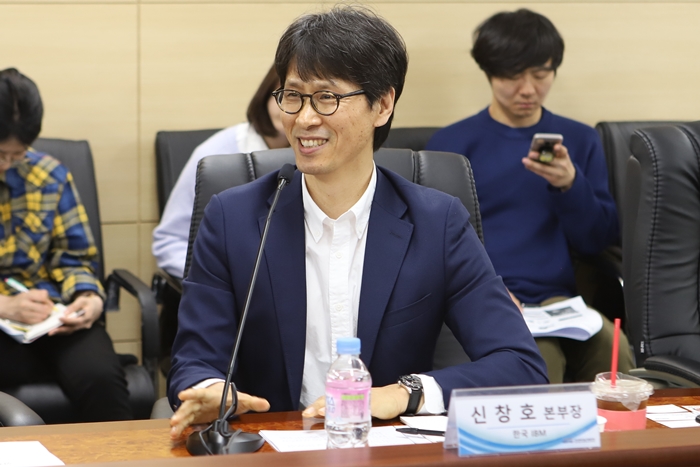
[▲ Chang Ho Shin (Director General, Research and Patent Licensing Asia-Pacific IP, IBM)]
In the panel discussion, Director General Chang Ho Shin said, “Currently, Korea is at a crossroad in deciding whether to put a focus on finding ways to utilize quantum computer, developing quantum computer that work through quantum mechanics, or nurturing its related human resources. We need to set certain goals before making this important decision.” He emphasized, “It is important to preempt a new IP rather than becoming a chaser of other countries, and we also need to come up with its related policies.”
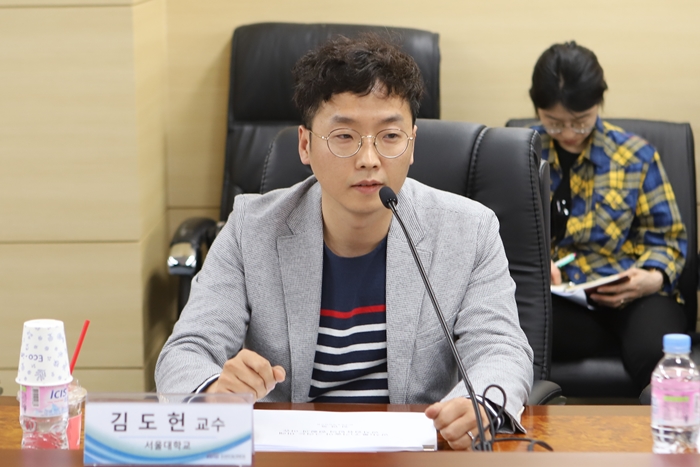
[▲ Dohun Kim (Assistant Professor, Department of Physics and Astronomy, SNU)]
Professor Dohun Kim stressed the need for quantum smart human resources, and said, “I feel more increased interest in quantum technology compared to 6 or 7 years ago. It is important to increase the number of cubits and increase the scale of the research however, it is also important to focus on one cubit to reduce errors.”
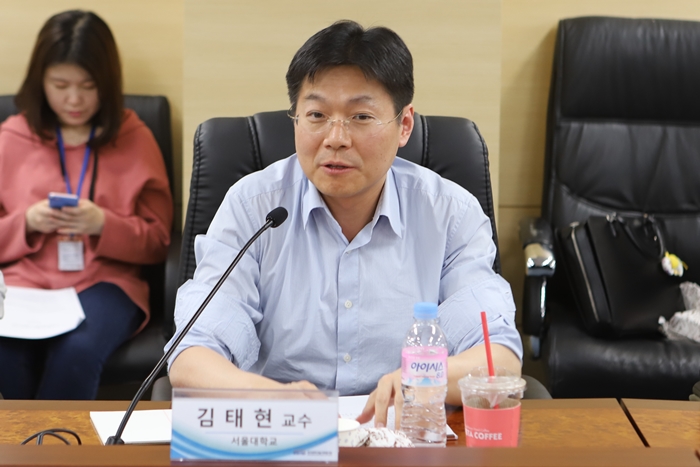
[▲ Taehyun Kim (Assistant Professor, Department of Coumputer Science and Engineering, SNU)]
Professor Taehyun Kim said, “The idea that quantum computers will solve all current problems or replace all computers with quantum computers is a misunderstanding. The misunderstandings should be clarified so that world-leading research will be enabled instead of a performance-oriented research.” He added, “If students are exposed to lectures on quantum technology in the educational field, they will be able to cultivate quantum technology human resources in the long term.”
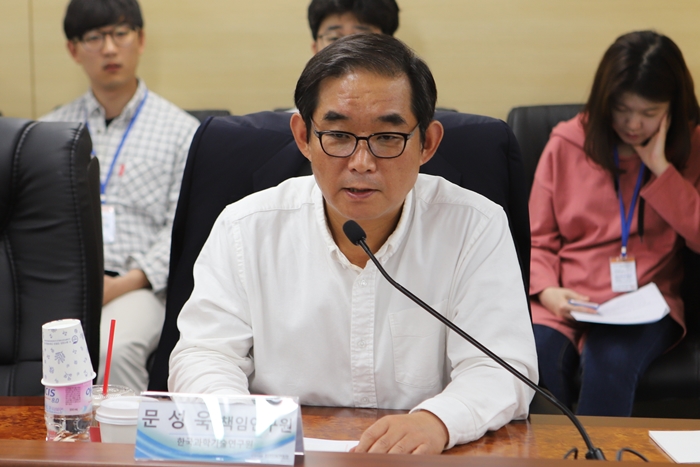
[▲ Sung Wook Moon (Principal Research Scientist / Director, Center for Quantum Information, KIST)]
Director Sung Wook Moon said, “Although quantum has high scores in communications field due to their non-replicable characteristics, I believe it is almost impossible to create a quantum computer that can be used in the near future. We need to present the possibility of creating 1,000 cubits with a continued support for quantum computers.”